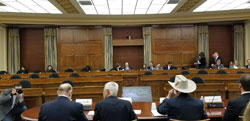On Nov. 29, 2017, Bob Helland, GCSAA director of congressional and federal affairs, attended a hearing before the House Science, Space, and Technology Committee, Subcommittee on Environment entitled "The Future of WOTUS".
The purpose of the hearing was to examine the legal and practical concerns the Clean Water Rule (commonly known as "WOTUS") has had on the states and what the impact might be of the proposed replacement rule currently being developed by the Trump Administration. Testifying before the subcommittee were a state official from the Arizona State Land Department and a rancher from Arizona, who each discussed the uncertainty with developing property when a potential "Water of the United States" was impacted. Also testifying to the legality of the rule – and it's potential replacement – were a representative from the Pacific Legal Foundation and a professor from American University who helped draft WOTUS.

The Clean Water Rule was stayed by federal courts shortly after it was finalized in 2015. The Trump Administration is moving forward with efforts to repeal the rule and replace it with one that limits the definition of Waters of the United States under the Clean Water Act along the lines of Justice Scalia in the Rapanos decision, i.e. relatively permanent waters and those with a continuous surface water connection to them. Subcommittee Chairman Andy Biggs (R-AZ), Ranking Member Suzanne Bonamici (D-OR), and the members of the subcommittee questioned the witnesses on what was the best way to define federal jurisdiction over waters. Wesley Mehl, deputy commissioner of the Arizona State Land Department, spoke of the difficulties of obtaining a Section 404 permit for developing the land that the department manages. Key to this is trying to determine whether dry washes (drainage areas with ephemeral or intermittent flow) are tributaries of navigable waters and covered under the Clean Water. James Chilton, a rancher from Arizona, also spoke of dry washes and the questions of whether they are tributaries. He testified that he had to stop development on one project that impacted one dry wash, even though there was no connection to water downstream. Reed Hopper from the Pacific Legal Foundation also spoke of the impact on property rights from the lack of clarity of federal jurisdiction. Ken Kopocis, a professor from American University who helped develop the rule while at the EPA, also spoke of the concerns with lack of clarity, however he indicated that adopting the Scalia language would create additional confusion over what constitutes a Water of the United States.
All of the witnesses testified to the need for a clear definition of what constitutes a Water of the United States. GCSAA has made that argument repeatedly since WOTUS was first under consideration, including most recently in comments we filed with the EPA on how small businesses such as golf are impacted. GCSAA will continue to monitor developments in Washington and continue to advocate for golf course management.